Organizational Behavior Report: 4com plc, Unit 12 Analysis
VerifiedAdded on 2020/10/04
|18
|5042
|298
Report
AI Summary
This report delves into the realm of organizational behavior, examining how culture, power, and politics affect team performance within 4com plc. It dissects the influence of Handy's Culture Model, categorizing organizational cultures and their impacts. The report further explores motivational theories, including Maslow's Hierarchy of Needs and Vroom's Expectancy Theory, and their application in influencing employee behavior. It differentiates between effective and ineffective teams, highlighting factors crucial for optimal performance. Finally, the report considers various organizational philosophies and concepts, providing a comprehensive analysis of organizational behavior principles and their practical implications.
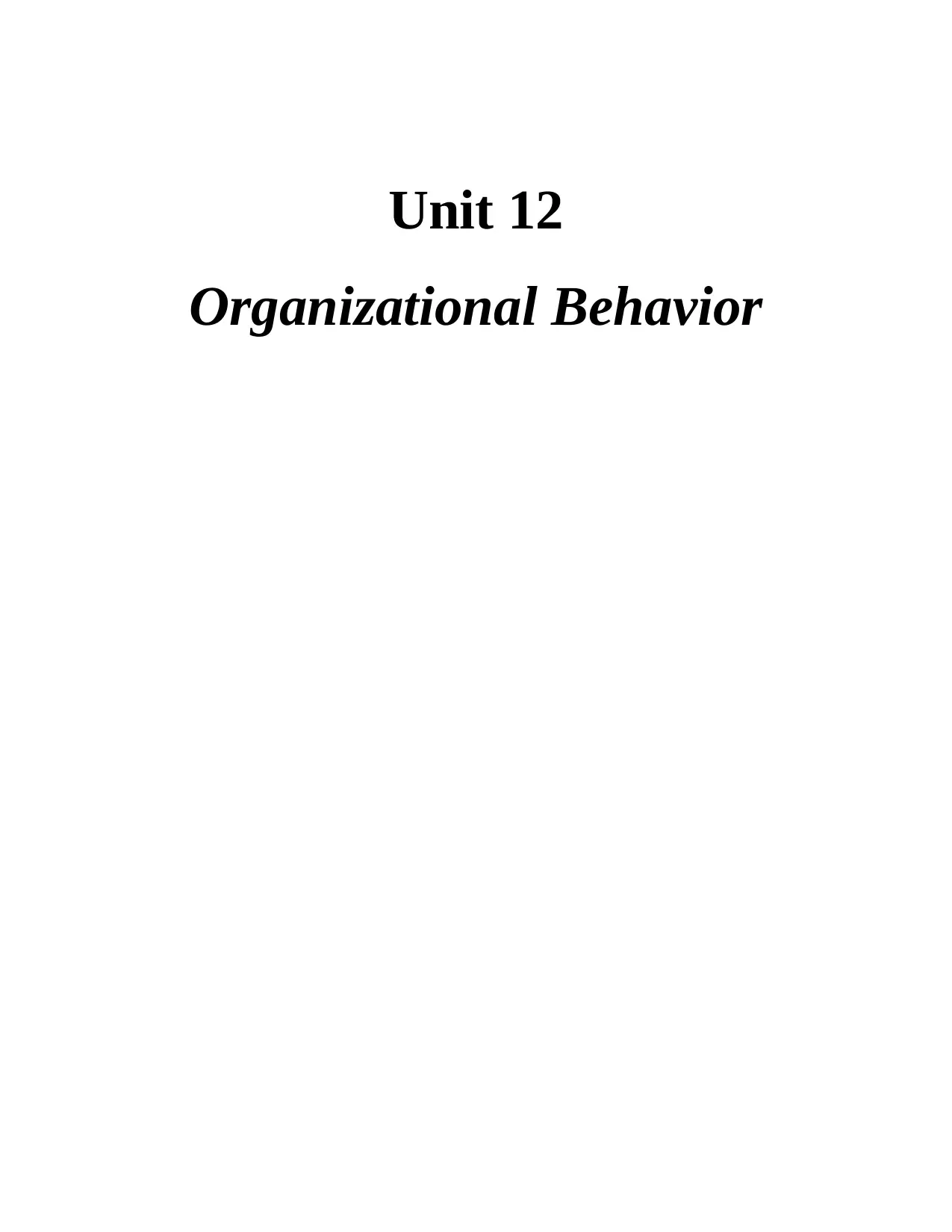
Unit 12
Organizational Behavior
Organizational Behavior
Paraphrase This Document
Need a fresh take? Get an instant paraphrase of this document with our AI Paraphraser
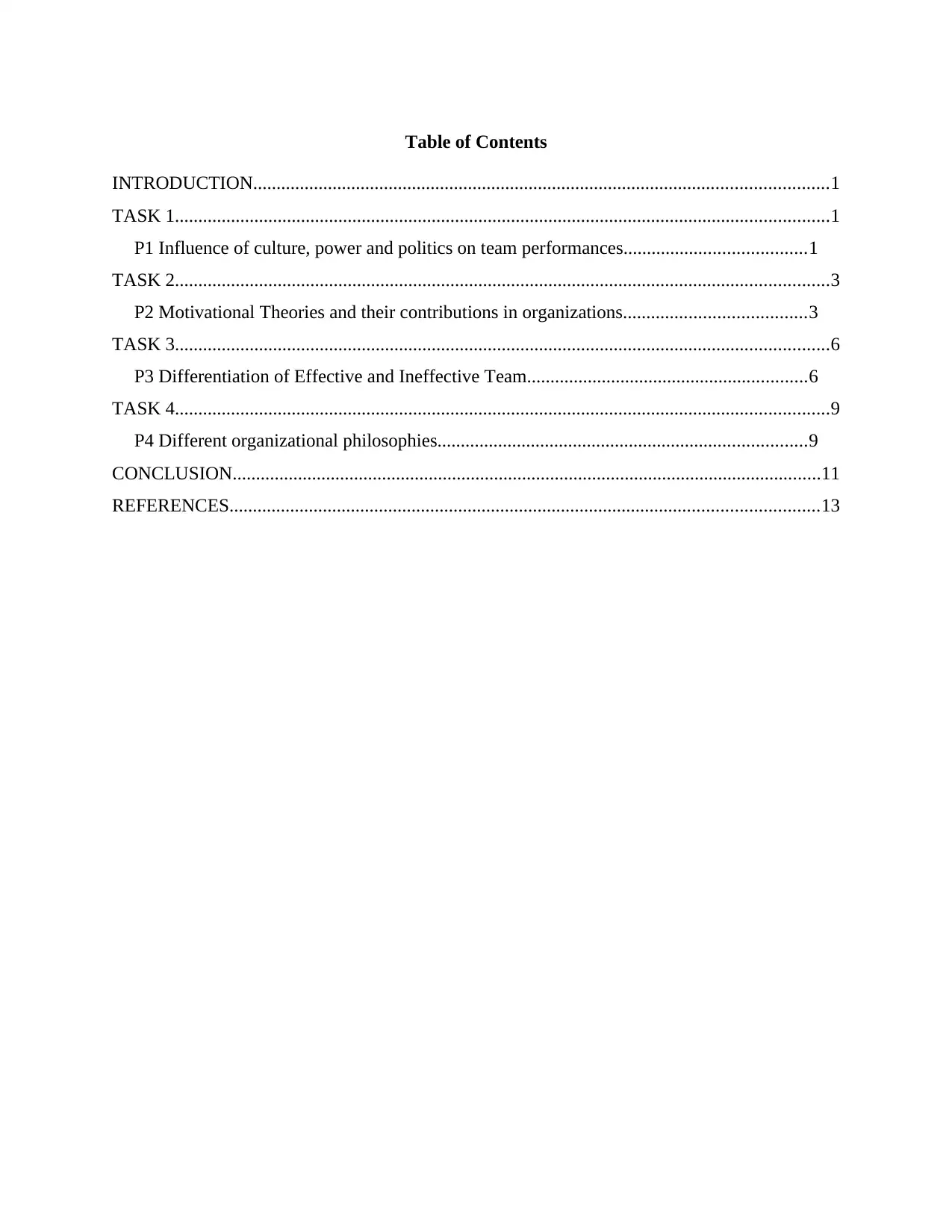
Table of Contents
INTRODUCTION...........................................................................................................................1
TASK 1............................................................................................................................................1
P1 Influence of culture, power and politics on team performances.......................................1
TASK 2............................................................................................................................................3
P2 Motivational Theories and their contributions in organizations.......................................3
TASK 3............................................................................................................................................6
P3 Differentiation of Effective and Ineffective Team............................................................6
TASK 4............................................................................................................................................9
P4 Different organizational philosophies...............................................................................9
CONCLUSION..............................................................................................................................11
REFERENCES..............................................................................................................................13
INTRODUCTION...........................................................................................................................1
TASK 1............................................................................................................................................1
P1 Influence of culture, power and politics on team performances.......................................1
TASK 2............................................................................................................................................3
P2 Motivational Theories and their contributions in organizations.......................................3
TASK 3............................................................................................................................................6
P3 Differentiation of Effective and Ineffective Team............................................................6
TASK 4............................................................................................................................................9
P4 Different organizational philosophies...............................................................................9
CONCLUSION..............................................................................................................................11
REFERENCES..............................................................................................................................13
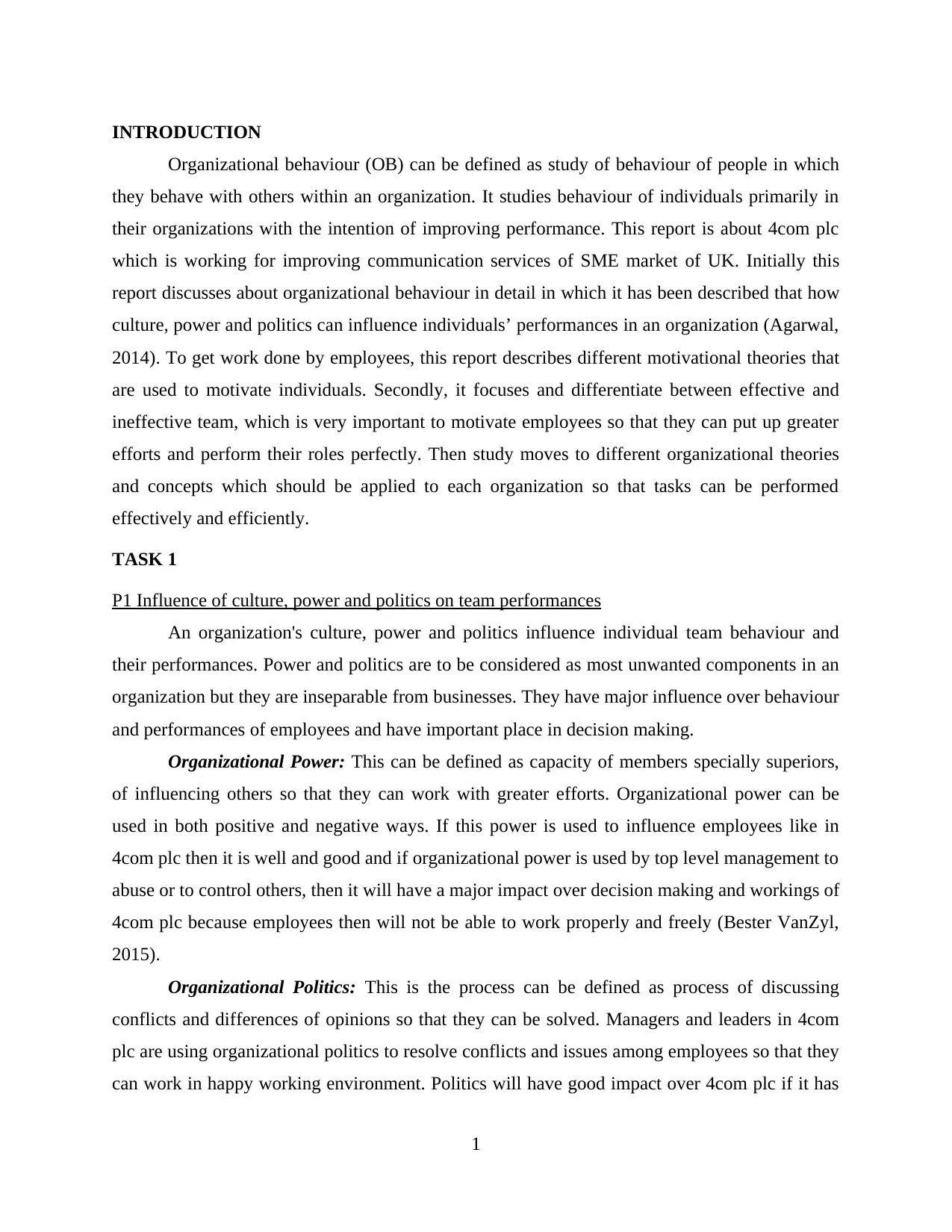
INTRODUCTION
Organizational behaviour (OB) can be defined as study of behaviour of people in which
they behave with others within an organization. It studies behaviour of individuals primarily in
their organizations with the intention of improving performance. This report is about 4com plc
which is working for improving communication services of SME market of UK. Initially this
report discusses about organizational behaviour in detail in which it has been described that how
culture, power and politics can influence individuals’ performances in an organization (Agarwal,
2014). To get work done by employees, this report describes different motivational theories that
are used to motivate individuals. Secondly, it focuses and differentiate between effective and
ineffective team, which is very important to motivate employees so that they can put up greater
efforts and perform their roles perfectly. Then study moves to different organizational theories
and concepts which should be applied to each organization so that tasks can be performed
effectively and efficiently.
TASK 1
P1 Influence of culture, power and politics on team performances
An organization's culture, power and politics influence individual team behaviour and
their performances. Power and politics are to be considered as most unwanted components in an
organization but they are inseparable from businesses. They have major influence over behaviour
and performances of employees and have important place in decision making.
Organizational Power: This can be defined as capacity of members specially superiors,
of influencing others so that they can work with greater efforts. Organizational power can be
used in both positive and negative ways. If this power is used to influence employees like in
4com plc then it is well and good and if organizational power is used by top level management to
abuse or to control others, then it will have a major impact over decision making and workings of
4com plc because employees then will not be able to work properly and freely (Bester VanZyl,
2015).
Organizational Politics: This is the process can be defined as process of discussing
conflicts and differences of opinions so that they can be solved. Managers and leaders in 4com
plc are using organizational politics to resolve conflicts and issues among employees so that they
can work in happy working environment. Politics will have good impact over 4com plc if it has
1
Organizational behaviour (OB) can be defined as study of behaviour of people in which
they behave with others within an organization. It studies behaviour of individuals primarily in
their organizations with the intention of improving performance. This report is about 4com plc
which is working for improving communication services of SME market of UK. Initially this
report discusses about organizational behaviour in detail in which it has been described that how
culture, power and politics can influence individuals’ performances in an organization (Agarwal,
2014). To get work done by employees, this report describes different motivational theories that
are used to motivate individuals. Secondly, it focuses and differentiate between effective and
ineffective team, which is very important to motivate employees so that they can put up greater
efforts and perform their roles perfectly. Then study moves to different organizational theories
and concepts which should be applied to each organization so that tasks can be performed
effectively and efficiently.
TASK 1
P1 Influence of culture, power and politics on team performances
An organization's culture, power and politics influence individual team behaviour and
their performances. Power and politics are to be considered as most unwanted components in an
organization but they are inseparable from businesses. They have major influence over behaviour
and performances of employees and have important place in decision making.
Organizational Power: This can be defined as capacity of members specially superiors,
of influencing others so that they can work with greater efforts. Organizational power can be
used in both positive and negative ways. If this power is used to influence employees like in
4com plc then it is well and good and if organizational power is used by top level management to
abuse or to control others, then it will have a major impact over decision making and workings of
4com plc because employees then will not be able to work properly and freely (Bester VanZyl,
2015).
Organizational Politics: This is the process can be defined as process of discussing
conflicts and differences of opinions so that they can be solved. Managers and leaders in 4com
plc are using organizational politics to resolve conflicts and issues among employees so that they
can work in happy working environment. Politics will have good impact over 4com plc if it has
1
⊘ This is a preview!⊘
Do you want full access?
Subscribe today to unlock all pages.

Trusted by 1+ million students worldwide
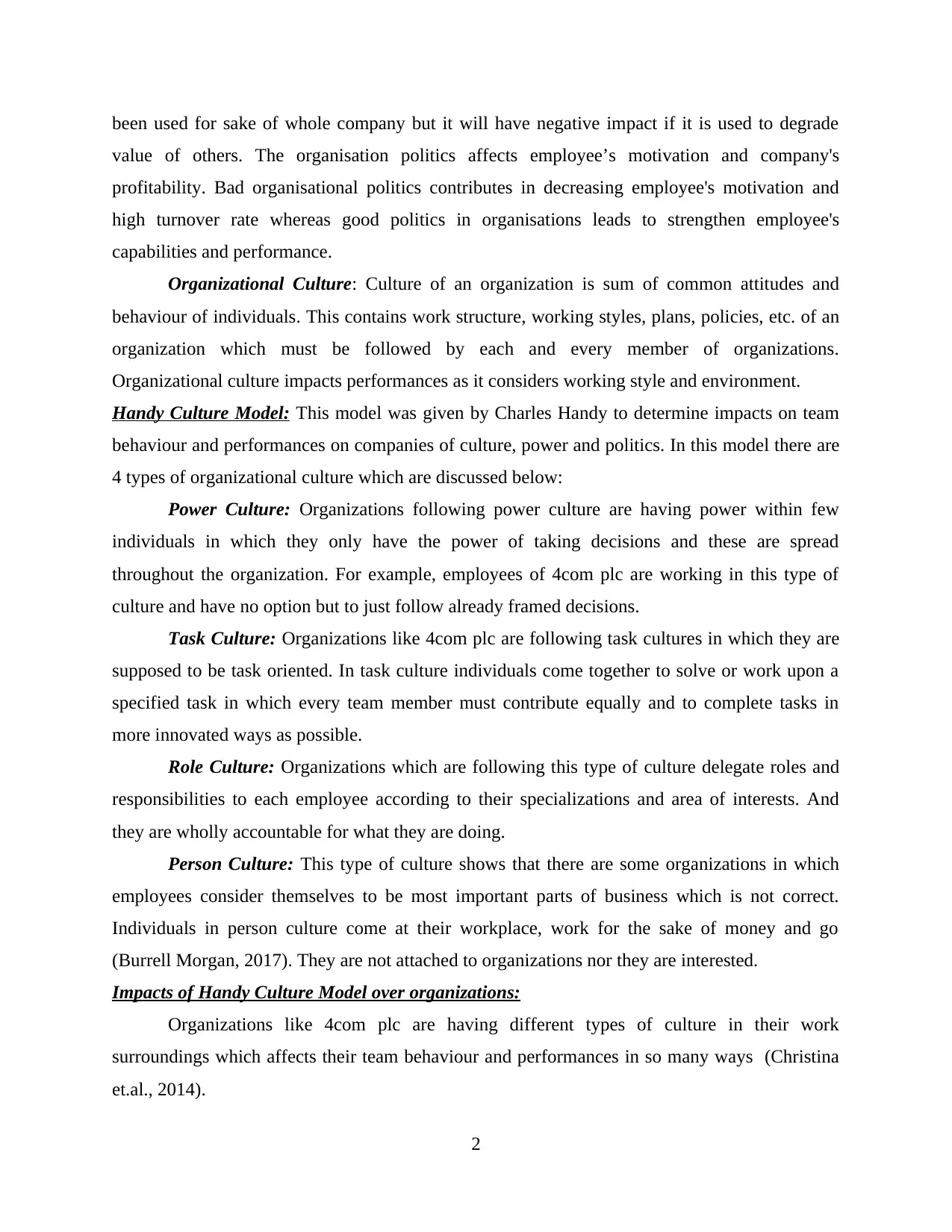
been used for sake of whole company but it will have negative impact if it is used to degrade
value of others. The organisation politics affects employee’s motivation and company's
profitability. Bad organisational politics contributes in decreasing employee's motivation and
high turnover rate whereas good politics in organisations leads to strengthen employee's
capabilities and performance.
Organizational Culture: Culture of an organization is sum of common attitudes and
behaviour of individuals. This contains work structure, working styles, plans, policies, etc. of an
organization which must be followed by each and every member of organizations.
Organizational culture impacts performances as it considers working style and environment.
Handy Culture Model: This model was given by Charles Handy to determine impacts on team
behaviour and performances on companies of culture, power and politics. In this model there are
4 types of organizational culture which are discussed below:
Power Culture: Organizations following power culture are having power within few
individuals in which they only have the power of taking decisions and these are spread
throughout the organization. For example, employees of 4com plc are working in this type of
culture and have no option but to just follow already framed decisions.
Task Culture: Organizations like 4com plc are following task cultures in which they are
supposed to be task oriented. In task culture individuals come together to solve or work upon a
specified task in which every team member must contribute equally and to complete tasks in
more innovated ways as possible.
Role Culture: Organizations which are following this type of culture delegate roles and
responsibilities to each employee according to their specializations and area of interests. And
they are wholly accountable for what they are doing.
Person Culture: This type of culture shows that there are some organizations in which
employees consider themselves to be most important parts of business which is not correct.
Individuals in person culture come at their workplace, work for the sake of money and go
(Burrell Morgan, 2017). They are not attached to organizations nor they are interested.
Impacts of Handy Culture Model over organizations:
Organizations like 4com plc are having different types of culture in their work
surroundings which affects their team behaviour and performances in so many ways (Christina
et.al., 2014).
2
value of others. The organisation politics affects employee’s motivation and company's
profitability. Bad organisational politics contributes in decreasing employee's motivation and
high turnover rate whereas good politics in organisations leads to strengthen employee's
capabilities and performance.
Organizational Culture: Culture of an organization is sum of common attitudes and
behaviour of individuals. This contains work structure, working styles, plans, policies, etc. of an
organization which must be followed by each and every member of organizations.
Organizational culture impacts performances as it considers working style and environment.
Handy Culture Model: This model was given by Charles Handy to determine impacts on team
behaviour and performances on companies of culture, power and politics. In this model there are
4 types of organizational culture which are discussed below:
Power Culture: Organizations following power culture are having power within few
individuals in which they only have the power of taking decisions and these are spread
throughout the organization. For example, employees of 4com plc are working in this type of
culture and have no option but to just follow already framed decisions.
Task Culture: Organizations like 4com plc are following task cultures in which they are
supposed to be task oriented. In task culture individuals come together to solve or work upon a
specified task in which every team member must contribute equally and to complete tasks in
more innovated ways as possible.
Role Culture: Organizations which are following this type of culture delegate roles and
responsibilities to each employee according to their specializations and area of interests. And
they are wholly accountable for what they are doing.
Person Culture: This type of culture shows that there are some organizations in which
employees consider themselves to be most important parts of business which is not correct.
Individuals in person culture come at their workplace, work for the sake of money and go
(Burrell Morgan, 2017). They are not attached to organizations nor they are interested.
Impacts of Handy Culture Model over organizations:
Organizations like 4com plc are having different types of culture in their work
surroundings which affects their team behaviour and performances in so many ways (Christina
et.al., 2014).
2
Paraphrase This Document
Need a fresh take? Get an instant paraphrase of this document with our AI Paraphraser
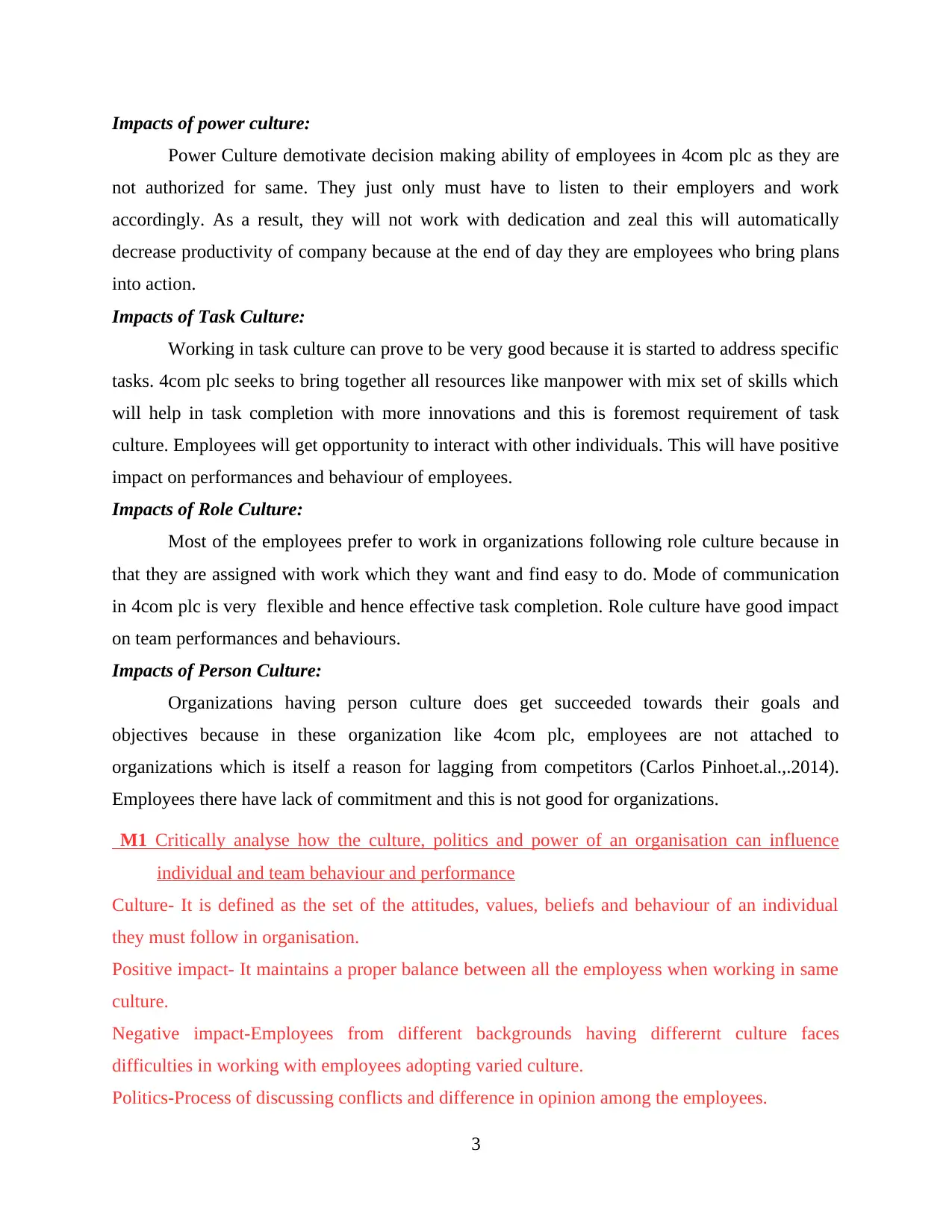
Impacts of power culture:
Power Culture demotivate decision making ability of employees in 4com plc as they are
not authorized for same. They just only must have to listen to their employers and work
accordingly. As a result, they will not work with dedication and zeal this will automatically
decrease productivity of company because at the end of day they are employees who bring plans
into action.
Impacts of Task Culture:
Working in task culture can prove to be very good because it is started to address specific
tasks. 4com plc seeks to bring together all resources like manpower with mix set of skills which
will help in task completion with more innovations and this is foremost requirement of task
culture. Employees will get opportunity to interact with other individuals. This will have positive
impact on performances and behaviour of employees.
Impacts of Role Culture:
Most of the employees prefer to work in organizations following role culture because in
that they are assigned with work which they want and find easy to do. Mode of communication
in 4com plc is very flexible and hence effective task completion. Role culture have good impact
on team performances and behaviours.
Impacts of Person Culture:
Organizations having person culture does get succeeded towards their goals and
objectives because in these organization like 4com plc, employees are not attached to
organizations which is itself a reason for lagging from competitors (Carlos Pinhoet.al.,.2014).
Employees there have lack of commitment and this is not good for organizations.
M1 Critically analyse how the culture, politics and power of an organisation can influence
individual and team behaviour and performance
Culture- It is defined as the set of the attitudes, values, beliefs and behaviour of an individual
they must follow in organisation.
Positive impact- It maintains a proper balance between all the employess when working in same
culture.
Negative impact-Employees from different backgrounds having differernt culture faces
difficulties in working with employees adopting varied culture.
Politics-Process of discussing conflicts and difference in opinion among the employees.
3
Power Culture demotivate decision making ability of employees in 4com plc as they are
not authorized for same. They just only must have to listen to their employers and work
accordingly. As a result, they will not work with dedication and zeal this will automatically
decrease productivity of company because at the end of day they are employees who bring plans
into action.
Impacts of Task Culture:
Working in task culture can prove to be very good because it is started to address specific
tasks. 4com plc seeks to bring together all resources like manpower with mix set of skills which
will help in task completion with more innovations and this is foremost requirement of task
culture. Employees will get opportunity to interact with other individuals. This will have positive
impact on performances and behaviour of employees.
Impacts of Role Culture:
Most of the employees prefer to work in organizations following role culture because in
that they are assigned with work which they want and find easy to do. Mode of communication
in 4com plc is very flexible and hence effective task completion. Role culture have good impact
on team performances and behaviours.
Impacts of Person Culture:
Organizations having person culture does get succeeded towards their goals and
objectives because in these organization like 4com plc, employees are not attached to
organizations which is itself a reason for lagging from competitors (Carlos Pinhoet.al.,.2014).
Employees there have lack of commitment and this is not good for organizations.
M1 Critically analyse how the culture, politics and power of an organisation can influence
individual and team behaviour and performance
Culture- It is defined as the set of the attitudes, values, beliefs and behaviour of an individual
they must follow in organisation.
Positive impact- It maintains a proper balance between all the employess when working in same
culture.
Negative impact-Employees from different backgrounds having differernt culture faces
difficulties in working with employees adopting varied culture.
Politics-Process of discussing conflicts and difference in opinion among the employees.
3
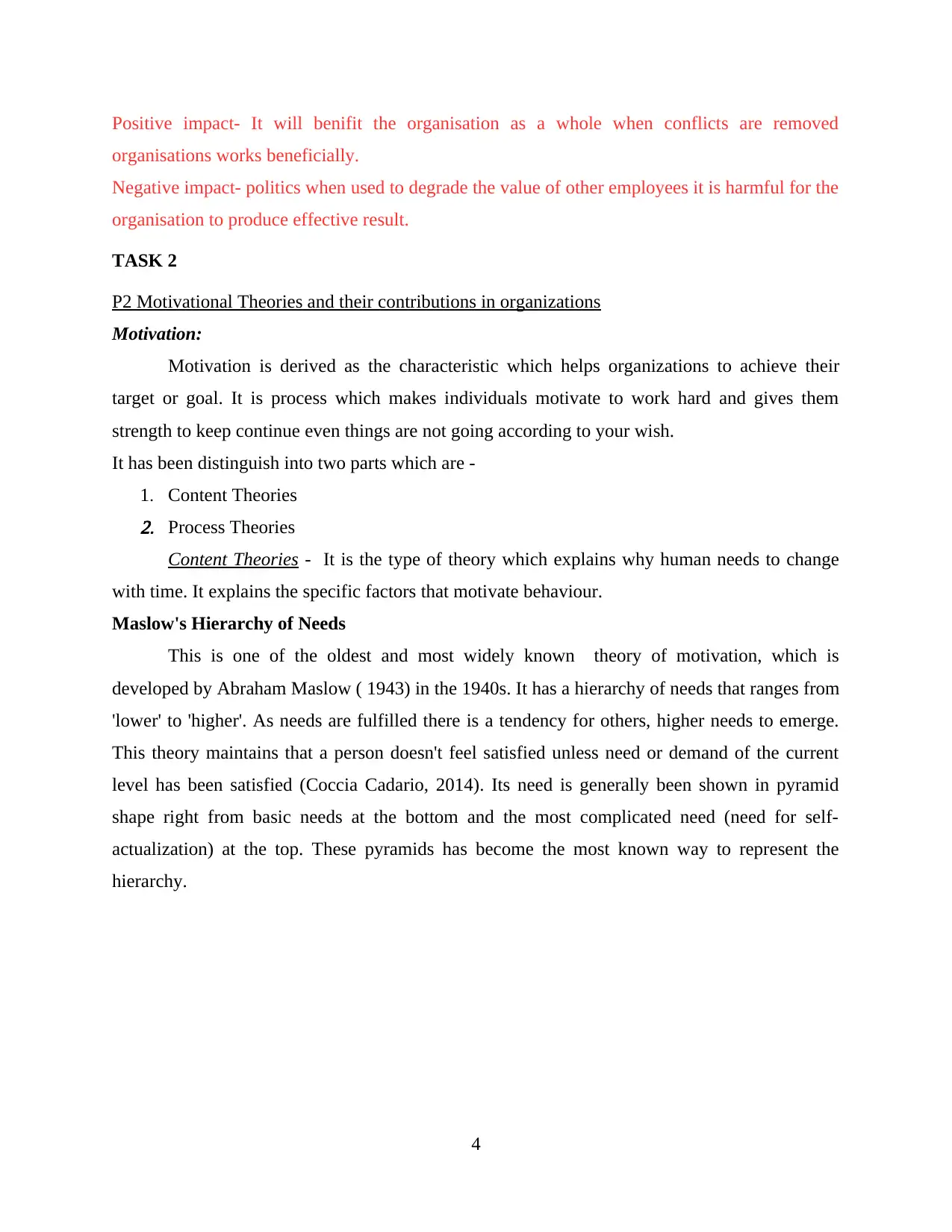
Positive impact- It will benifit the organisation as a whole when conflicts are removed
organisations works beneficially.
Negative impact- politics when used to degrade the value of other employees it is harmful for the
organisation to produce effective result.
TASK 2
P2 Motivational Theories and their contributions in organizations
Motivation:
Motivation is derived as the characteristic which helps organizations to achieve their
target or goal. It is process which makes individuals motivate to work hard and gives them
strength to keep continue even things are not going according to your wish.
It has been distinguish into two parts which are -
1. Content Theories2. Process Theories
Content Theories - It is the type of theory which explains why human needs to change
with time. It explains the specific factors that motivate behaviour.
Maslow's Hierarchy of Needs
This is one of the oldest and most widely known theory of motivation, which is
developed by Abraham Maslow ( 1943) in the 1940s. It has a hierarchy of needs that ranges from
'lower' to 'higher'. As needs are fulfilled there is a tendency for others, higher needs to emerge.
This theory maintains that a person doesn't feel satisfied unless need or demand of the current
level has been satisfied (Coccia Cadario, 2014). Its need is generally been shown in pyramid
shape right from basic needs at the bottom and the most complicated need (need for self-
actualization) at the top. These pyramids has become the most known way to represent the
hierarchy.
4
organisations works beneficially.
Negative impact- politics when used to degrade the value of other employees it is harmful for the
organisation to produce effective result.
TASK 2
P2 Motivational Theories and their contributions in organizations
Motivation:
Motivation is derived as the characteristic which helps organizations to achieve their
target or goal. It is process which makes individuals motivate to work hard and gives them
strength to keep continue even things are not going according to your wish.
It has been distinguish into two parts which are -
1. Content Theories2. Process Theories
Content Theories - It is the type of theory which explains why human needs to change
with time. It explains the specific factors that motivate behaviour.
Maslow's Hierarchy of Needs
This is one of the oldest and most widely known theory of motivation, which is
developed by Abraham Maslow ( 1943) in the 1940s. It has a hierarchy of needs that ranges from
'lower' to 'higher'. As needs are fulfilled there is a tendency for others, higher needs to emerge.
This theory maintains that a person doesn't feel satisfied unless need or demand of the current
level has been satisfied (Coccia Cadario, 2014). Its need is generally been shown in pyramid
shape right from basic needs at the bottom and the most complicated need (need for self-
actualization) at the top. These pyramids has become the most known way to represent the
hierarchy.
4
⊘ This is a preview!⊘
Do you want full access?
Subscribe today to unlock all pages.

Trusted by 1+ million students worldwide
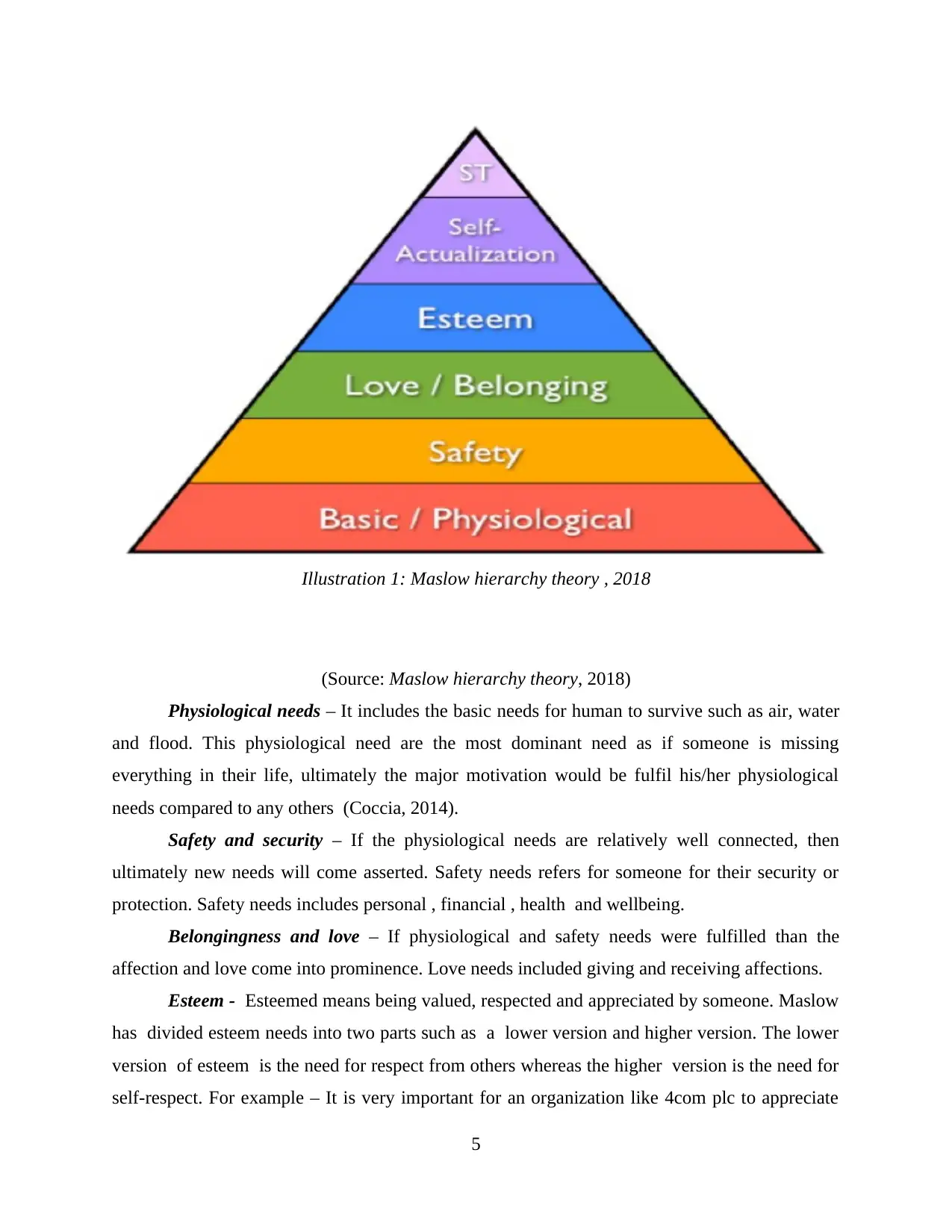
(Source: Maslow hierarchy theory, 2018)
Physiological needs – It includes the basic needs for human to survive such as air, water
and flood. This physiological need are the most dominant need as if someone is missing
everything in their life, ultimately the major motivation would be fulfil his/her physiological
needs compared to any others (Coccia, 2014).
Safety and security – If the physiological needs are relatively well connected, then
ultimately new needs will come asserted. Safety needs refers for someone for their security or
protection. Safety needs includes personal , financial , health and wellbeing.
Belongingness and love – If physiological and safety needs were fulfilled than the
affection and love come into prominence. Love needs included giving and receiving affections.
Esteem - Esteemed means being valued, respected and appreciated by someone. Maslow
has divided esteem needs into two parts such as a lower version and higher version. The lower
version of esteem is the need for respect from others whereas the higher version is the need for
self-respect. For example – It is very important for an organization like 4com plc to appreciate
5
Illustration 1: Maslow hierarchy theory , 2018
Physiological needs – It includes the basic needs for human to survive such as air, water
and flood. This physiological need are the most dominant need as if someone is missing
everything in their life, ultimately the major motivation would be fulfil his/her physiological
needs compared to any others (Coccia, 2014).
Safety and security – If the physiological needs are relatively well connected, then
ultimately new needs will come asserted. Safety needs refers for someone for their security or
protection. Safety needs includes personal , financial , health and wellbeing.
Belongingness and love – If physiological and safety needs were fulfilled than the
affection and love come into prominence. Love needs included giving and receiving affections.
Esteem - Esteemed means being valued, respected and appreciated by someone. Maslow
has divided esteem needs into two parts such as a lower version and higher version. The lower
version of esteem is the need for respect from others whereas the higher version is the need for
self-respect. For example – It is very important for an organization like 4com plc to appreciate
5
Illustration 1: Maslow hierarchy theory , 2018
Paraphrase This Document
Need a fresh take? Get an instant paraphrase of this document with our AI Paraphraser
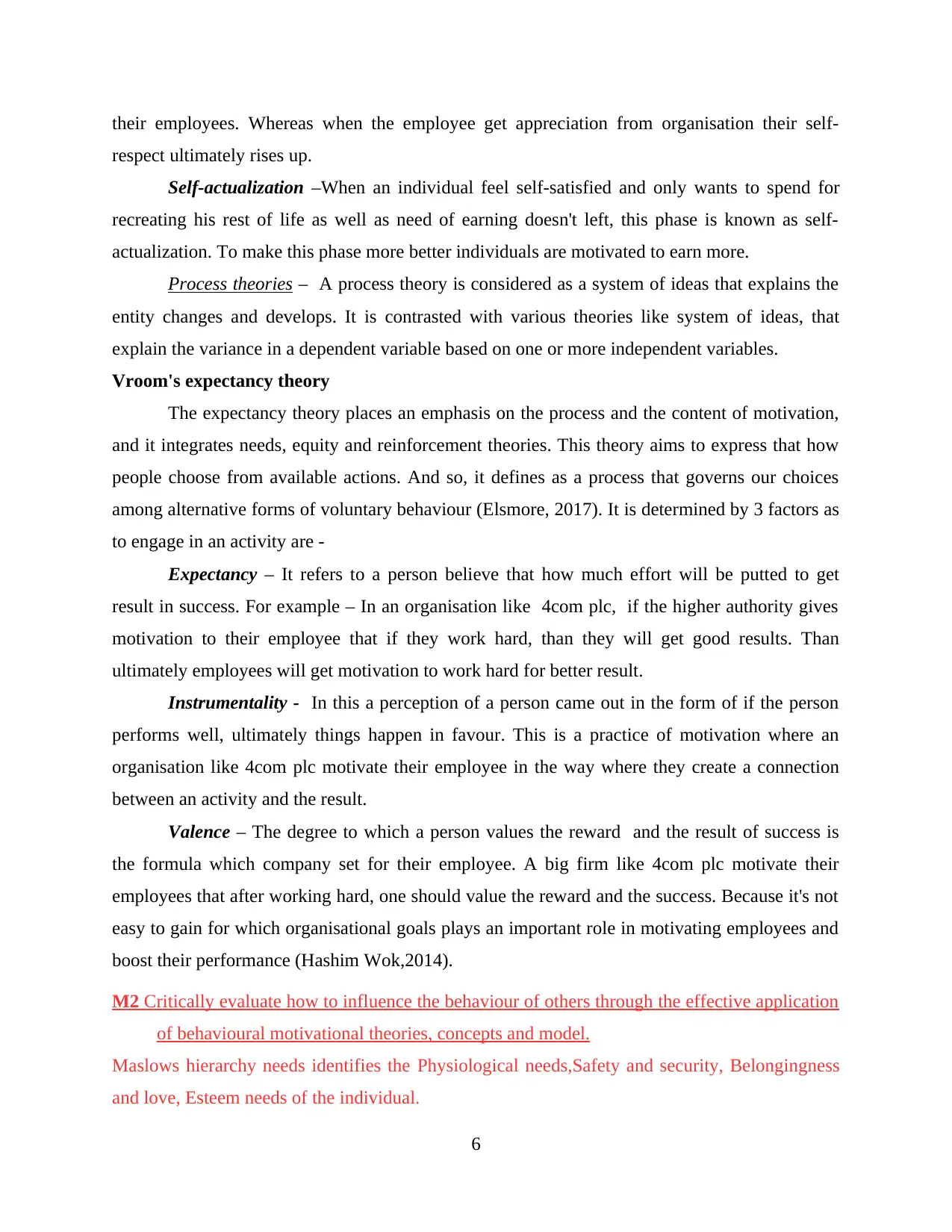
their employees. Whereas when the employee get appreciation from organisation their self-
respect ultimately rises up.
Self-actualization –When an individual feel self-satisfied and only wants to spend for
recreating his rest of life as well as need of earning doesn't left, this phase is known as self-
actualization. To make this phase more better individuals are motivated to earn more.
Process theories – A process theory is considered as a system of ideas that explains the
entity changes and develops. It is contrasted with various theories like system of ideas, that
explain the variance in a dependent variable based on one or more independent variables.
Vroom's expectancy theory
The expectancy theory places an emphasis on the process and the content of motivation,
and it integrates needs, equity and reinforcement theories. This theory aims to express that how
people choose from available actions. And so, it defines as a process that governs our choices
among alternative forms of voluntary behaviour (Elsmore, 2017). It is determined by 3 factors as
to engage in an activity are -
Expectancy – It refers to a person believe that how much effort will be putted to get
result in success. For example – In an organisation like 4com plc, if the higher authority gives
motivation to their employee that if they work hard, than they will get good results. Than
ultimately employees will get motivation to work hard for better result.
Instrumentality - In this a perception of a person came out in the form of if the person
performs well, ultimately things happen in favour. This is a practice of motivation where an
organisation like 4com plc motivate their employee in the way where they create a connection
between an activity and the result.
Valence – The degree to which a person values the reward and the result of success is
the formula which company set for their employee. A big firm like 4com plc motivate their
employees that after working hard, one should value the reward and the success. Because it's not
easy to gain for which organisational goals plays an important role in motivating employees and
boost their performance (Hashim Wok,2014).
M2 Critically evaluate how to influence the behaviour of others through the effective application
of behavioural motivational theories, concepts and model.
Maslows hierarchy needs identifies the Physiological needs,Safety and security, Belongingness
and love, Esteem needs of the individual.
6
respect ultimately rises up.
Self-actualization –When an individual feel self-satisfied and only wants to spend for
recreating his rest of life as well as need of earning doesn't left, this phase is known as self-
actualization. To make this phase more better individuals are motivated to earn more.
Process theories – A process theory is considered as a system of ideas that explains the
entity changes and develops. It is contrasted with various theories like system of ideas, that
explain the variance in a dependent variable based on one or more independent variables.
Vroom's expectancy theory
The expectancy theory places an emphasis on the process and the content of motivation,
and it integrates needs, equity and reinforcement theories. This theory aims to express that how
people choose from available actions. And so, it defines as a process that governs our choices
among alternative forms of voluntary behaviour (Elsmore, 2017). It is determined by 3 factors as
to engage in an activity are -
Expectancy – It refers to a person believe that how much effort will be putted to get
result in success. For example – In an organisation like 4com plc, if the higher authority gives
motivation to their employee that if they work hard, than they will get good results. Than
ultimately employees will get motivation to work hard for better result.
Instrumentality - In this a perception of a person came out in the form of if the person
performs well, ultimately things happen in favour. This is a practice of motivation where an
organisation like 4com plc motivate their employee in the way where they create a connection
between an activity and the result.
Valence – The degree to which a person values the reward and the result of success is
the formula which company set for their employee. A big firm like 4com plc motivate their
employees that after working hard, one should value the reward and the success. Because it's not
easy to gain for which organisational goals plays an important role in motivating employees and
boost their performance (Hashim Wok,2014).
M2 Critically evaluate how to influence the behaviour of others through the effective application
of behavioural motivational theories, concepts and model.
Maslows hierarchy needs identifies the Physiological needs,Safety and security, Belongingness
and love, Esteem needs of the individual.
6
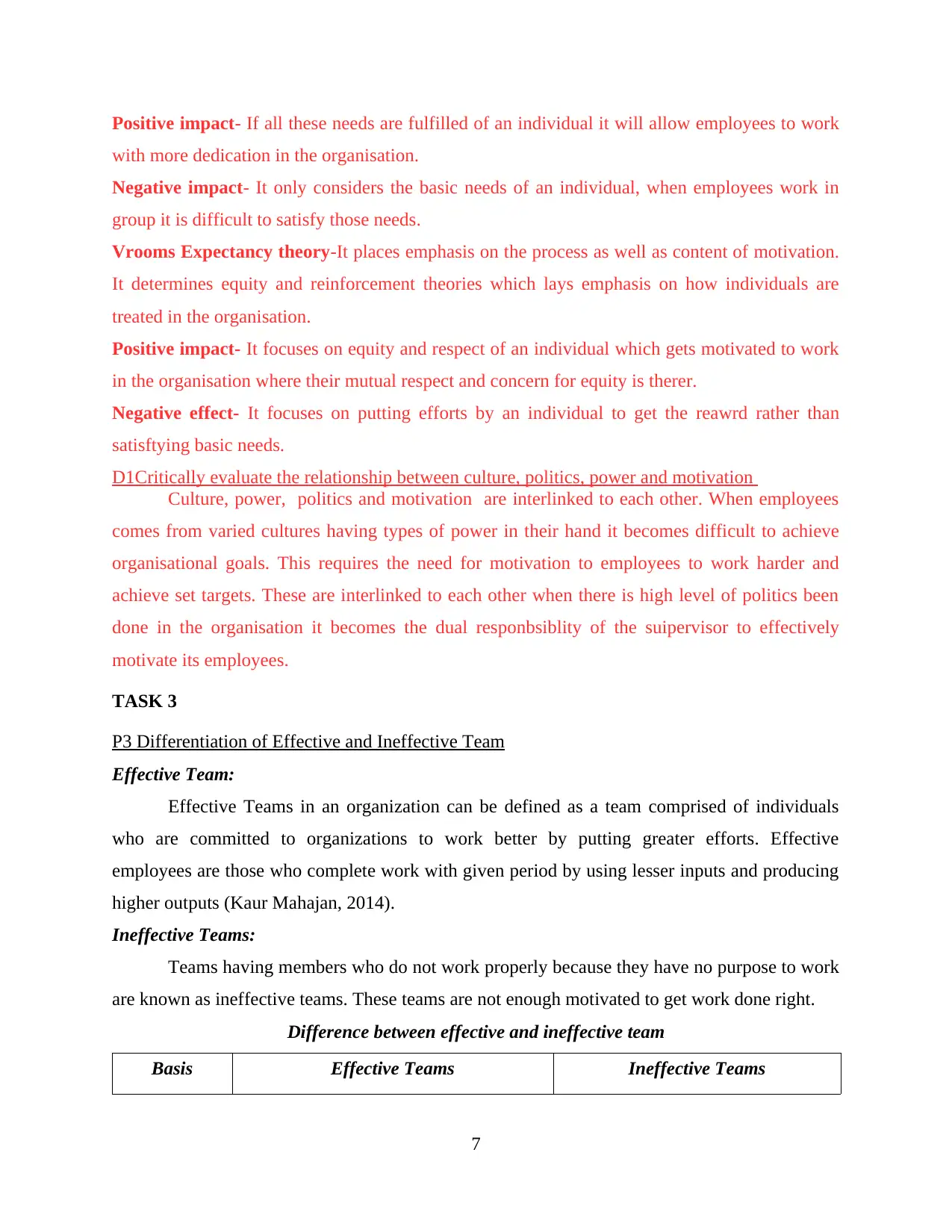
Positive impact- If all these needs are fulfilled of an individual it will allow employees to work
with more dedication in the organisation.
Negative impact- It only considers the basic needs of an individual, when employees work in
group it is difficult to satisfy those needs.
Vrooms Expectancy theory-It places emphasis on the process as well as content of motivation.
It determines equity and reinforcement theories which lays emphasis on how individuals are
treated in the organisation.
Positive impact- It focuses on equity and respect of an individual which gets motivated to work
in the organisation where their mutual respect and concern for equity is therer.
Negative effect- It focuses on putting efforts by an individual to get the reawrd rather than
satisftying basic needs.
D1Critically evaluate the relationship between culture, politics, power and motivation
Culture, power, politics and motivation are interlinked to each other. When employees
comes from varied cultures having types of power in their hand it becomes difficult to achieve
organisational goals. This requires the need for motivation to employees to work harder and
achieve set targets. These are interlinked to each other when there is high level of politics been
done in the organisation it becomes the dual responbsiblity of the suipervisor to effectively
motivate its employees.
TASK 3
P3 Differentiation of Effective and Ineffective Team
Effective Team:
Effective Teams in an organization can be defined as a team comprised of individuals
who are committed to organizations to work better by putting greater efforts. Effective
employees are those who complete work with given period by using lesser inputs and producing
higher outputs (Kaur Mahajan, 2014).
Ineffective Teams:
Teams having members who do not work properly because they have no purpose to work
are known as ineffective teams. These teams are not enough motivated to get work done right.
Difference between effective and ineffective team
Basis Effective Teams Ineffective Teams
7
with more dedication in the organisation.
Negative impact- It only considers the basic needs of an individual, when employees work in
group it is difficult to satisfy those needs.
Vrooms Expectancy theory-It places emphasis on the process as well as content of motivation.
It determines equity and reinforcement theories which lays emphasis on how individuals are
treated in the organisation.
Positive impact- It focuses on equity and respect of an individual which gets motivated to work
in the organisation where their mutual respect and concern for equity is therer.
Negative effect- It focuses on putting efforts by an individual to get the reawrd rather than
satisftying basic needs.
D1Critically evaluate the relationship between culture, politics, power and motivation
Culture, power, politics and motivation are interlinked to each other. When employees
comes from varied cultures having types of power in their hand it becomes difficult to achieve
organisational goals. This requires the need for motivation to employees to work harder and
achieve set targets. These are interlinked to each other when there is high level of politics been
done in the organisation it becomes the dual responbsiblity of the suipervisor to effectively
motivate its employees.
TASK 3
P3 Differentiation of Effective and Ineffective Team
Effective Team:
Effective Teams in an organization can be defined as a team comprised of individuals
who are committed to organizations to work better by putting greater efforts. Effective
employees are those who complete work with given period by using lesser inputs and producing
higher outputs (Kaur Mahajan, 2014).
Ineffective Teams:
Teams having members who do not work properly because they have no purpose to work
are known as ineffective teams. These teams are not enough motivated to get work done right.
Difference between effective and ineffective team
Basis Effective Teams Ineffective Teams
7
⊘ This is a preview!⊘
Do you want full access?
Subscribe today to unlock all pages.

Trusted by 1+ million students worldwide
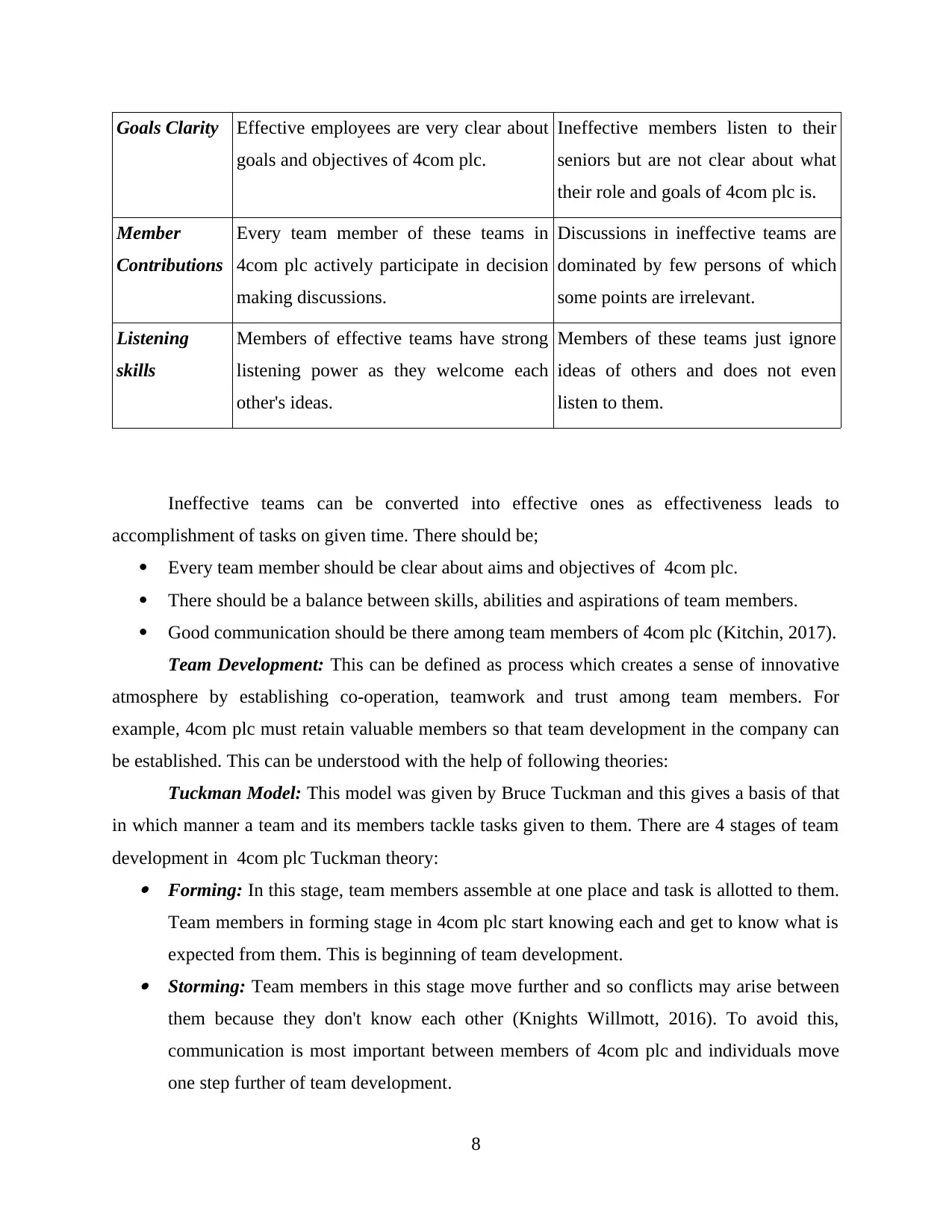
Goals Clarity Effective employees are very clear about
goals and objectives of 4com plc.
Ineffective members listen to their
seniors but are not clear about what
their role and goals of 4com plc is.
Member
Contributions
Every team member of these teams in
4com plc actively participate in decision
making discussions.
Discussions in ineffective teams are
dominated by few persons of which
some points are irrelevant.
Listening
skills
Members of effective teams have strong
listening power as they welcome each
other's ideas.
Members of these teams just ignore
ideas of others and does not even
listen to them.
Ineffective teams can be converted into effective ones as effectiveness leads to
accomplishment of tasks on given time. There should be;
Every team member should be clear about aims and objectives of 4com plc.
There should be a balance between skills, abilities and aspirations of team members.
Good communication should be there among team members of 4com plc (Kitchin, 2017).
Team Development: This can be defined as process which creates a sense of innovative
atmosphere by establishing co-operation, teamwork and trust among team members. For
example, 4com plc must retain valuable members so that team development in the company can
be established. This can be understood with the help of following theories:
Tuckman Model: This model was given by Bruce Tuckman and this gives a basis of that
in which manner a team and its members tackle tasks given to them. There are 4 stages of team
development in 4com plc Tuckman theory: Forming: In this stage, team members assemble at one place and task is allotted to them.
Team members in forming stage in 4com plc start knowing each and get to know what is
expected from them. This is beginning of team development. Storming: Team members in this stage move further and so conflicts may arise between
them because they don't know each other (Knights Willmott, 2016). To avoid this,
communication is most important between members of 4com plc and individuals move
one step further of team development.
8
goals and objectives of 4com plc.
Ineffective members listen to their
seniors but are not clear about what
their role and goals of 4com plc is.
Member
Contributions
Every team member of these teams in
4com plc actively participate in decision
making discussions.
Discussions in ineffective teams are
dominated by few persons of which
some points are irrelevant.
Listening
skills
Members of effective teams have strong
listening power as they welcome each
other's ideas.
Members of these teams just ignore
ideas of others and does not even
listen to them.
Ineffective teams can be converted into effective ones as effectiveness leads to
accomplishment of tasks on given time. There should be;
Every team member should be clear about aims and objectives of 4com plc.
There should be a balance between skills, abilities and aspirations of team members.
Good communication should be there among team members of 4com plc (Kitchin, 2017).
Team Development: This can be defined as process which creates a sense of innovative
atmosphere by establishing co-operation, teamwork and trust among team members. For
example, 4com plc must retain valuable members so that team development in the company can
be established. This can be understood with the help of following theories:
Tuckman Model: This model was given by Bruce Tuckman and this gives a basis of that
in which manner a team and its members tackle tasks given to them. There are 4 stages of team
development in 4com plc Tuckman theory: Forming: In this stage, team members assemble at one place and task is allotted to them.
Team members in forming stage in 4com plc start knowing each and get to know what is
expected from them. This is beginning of team development. Storming: Team members in this stage move further and so conflicts may arise between
them because they don't know each other (Knights Willmott, 2016). To avoid this,
communication is most important between members of 4com plc and individuals move
one step further of team development.
8
Paraphrase This Document
Need a fresh take? Get an instant paraphrase of this document with our AI Paraphraser
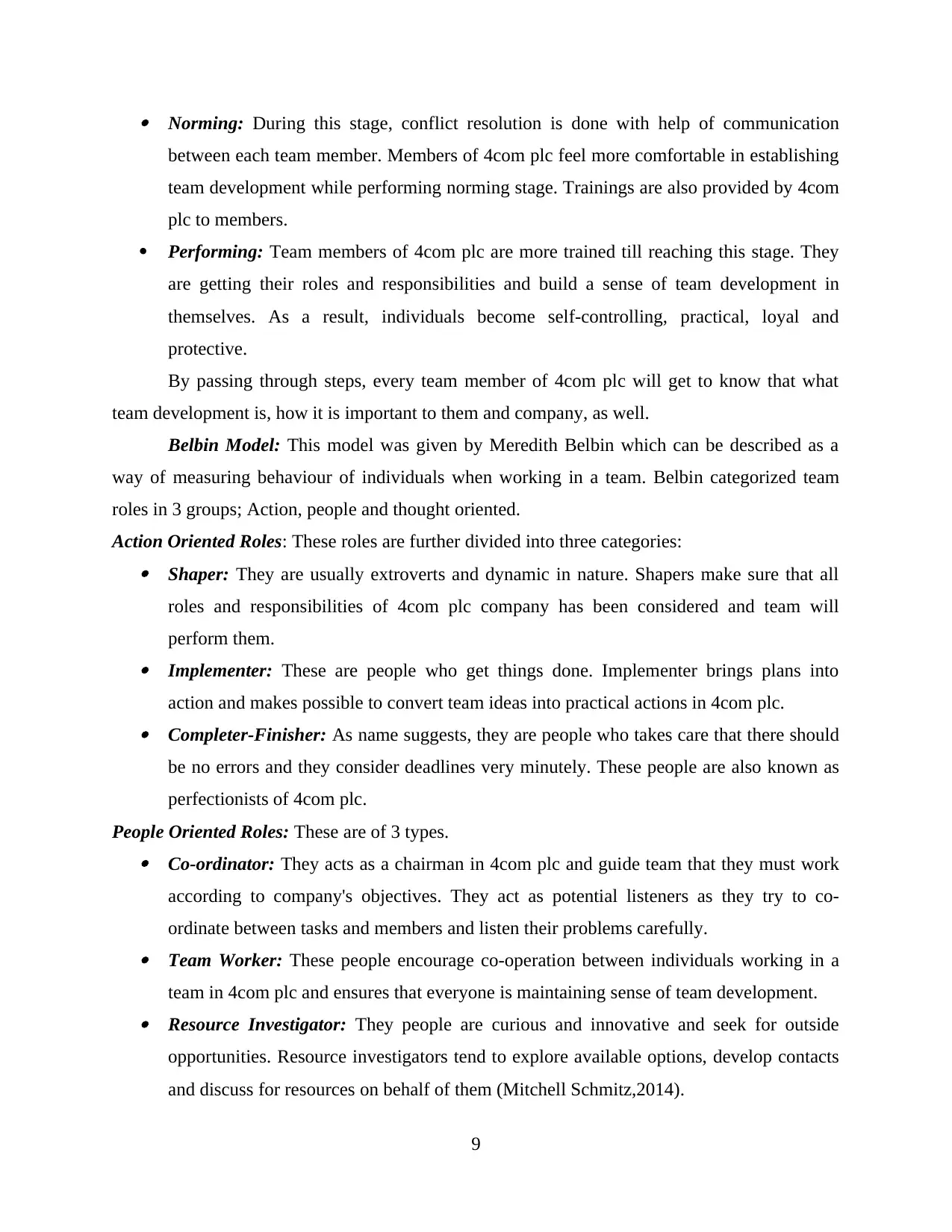
Norming: During this stage, conflict resolution is done with help of communication
between each team member. Members of 4com plc feel more comfortable in establishing
team development while performing norming stage. Trainings are also provided by 4com
plc to members.
Performing: Team members of 4com plc are more trained till reaching this stage. They
are getting their roles and responsibilities and build a sense of team development in
themselves. As a result, individuals become self-controlling, practical, loyal and
protective.
By passing through steps, every team member of 4com plc will get to know that what
team development is, how it is important to them and company, as well.
Belbin Model: This model was given by Meredith Belbin which can be described as a
way of measuring behaviour of individuals when working in a team. Belbin categorized team
roles in 3 groups; Action, people and thought oriented.
Action Oriented Roles: These roles are further divided into three categories: Shaper: They are usually extroverts and dynamic in nature. Shapers make sure that all
roles and responsibilities of 4com plc company has been considered and team will
perform them. Implementer: These are people who get things done. Implementer brings plans into
action and makes possible to convert team ideas into practical actions in 4com plc. Completer-Finisher: As name suggests, they are people who takes care that there should
be no errors and they consider deadlines very minutely. These people are also known as
perfectionists of 4com plc.
People Oriented Roles: These are of 3 types. Co-ordinator: They acts as a chairman in 4com plc and guide team that they must work
according to company's objectives. They act as potential listeners as they try to co-
ordinate between tasks and members and listen their problems carefully. Team Worker: These people encourage co-operation between individuals working in a
team in 4com plc and ensures that everyone is maintaining sense of team development. Resource Investigator: They people are curious and innovative and seek for outside
opportunities. Resource investigators tend to explore available options, develop contacts
and discuss for resources on behalf of them (Mitchell Schmitz,2014).
9
between each team member. Members of 4com plc feel more comfortable in establishing
team development while performing norming stage. Trainings are also provided by 4com
plc to members.
Performing: Team members of 4com plc are more trained till reaching this stage. They
are getting their roles and responsibilities and build a sense of team development in
themselves. As a result, individuals become self-controlling, practical, loyal and
protective.
By passing through steps, every team member of 4com plc will get to know that what
team development is, how it is important to them and company, as well.
Belbin Model: This model was given by Meredith Belbin which can be described as a
way of measuring behaviour of individuals when working in a team. Belbin categorized team
roles in 3 groups; Action, people and thought oriented.
Action Oriented Roles: These roles are further divided into three categories: Shaper: They are usually extroverts and dynamic in nature. Shapers make sure that all
roles and responsibilities of 4com plc company has been considered and team will
perform them. Implementer: These are people who get things done. Implementer brings plans into
action and makes possible to convert team ideas into practical actions in 4com plc. Completer-Finisher: As name suggests, they are people who takes care that there should
be no errors and they consider deadlines very minutely. These people are also known as
perfectionists of 4com plc.
People Oriented Roles: These are of 3 types. Co-ordinator: They acts as a chairman in 4com plc and guide team that they must work
according to company's objectives. They act as potential listeners as they try to co-
ordinate between tasks and members and listen their problems carefully. Team Worker: These people encourage co-operation between individuals working in a
team in 4com plc and ensures that everyone is maintaining sense of team development. Resource Investigator: They people are curious and innovative and seek for outside
opportunities. Resource investigators tend to explore available options, develop contacts
and discuss for resources on behalf of them (Mitchell Schmitz,2014).
9
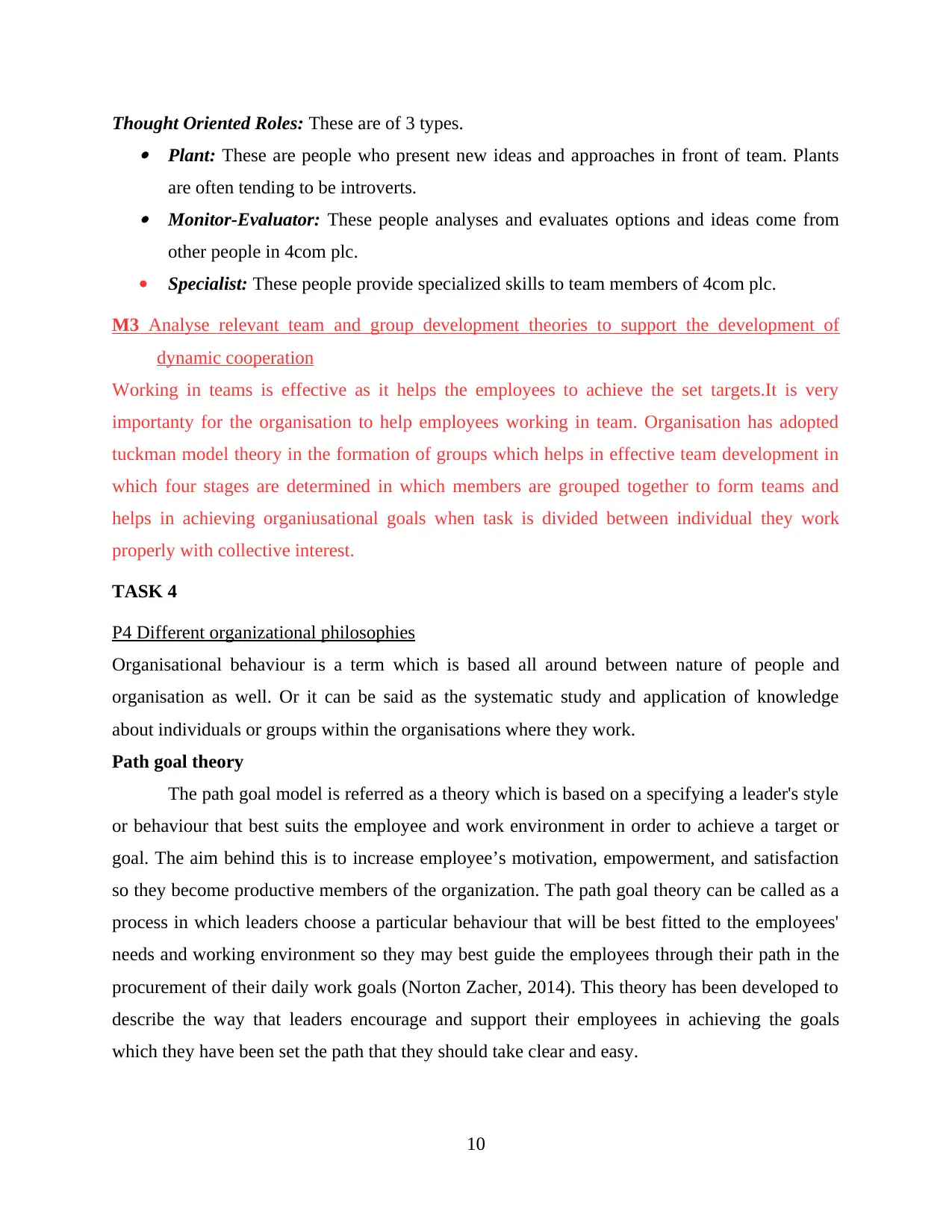
Thought Oriented Roles: These are of 3 types. Plant: These are people who present new ideas and approaches in front of team. Plants
are often tending to be introverts. Monitor-Evaluator: These people analyses and evaluates options and ideas come from
other people in 4com plc.
Specialist: These people provide specialized skills to team members of 4com plc.
M3 Analyse relevant team and group development theories to support the development of
dynamic cooperation
Working in teams is effective as it helps the employees to achieve the set targets.It is very
importanty for the organisation to help employees working in team. Organisation has adopted
tuckman model theory in the formation of groups which helps in effective team development in
which four stages are determined in which members are grouped together to form teams and
helps in achieving organiusational goals when task is divided between individual they work
properly with collective interest.
TASK 4
P4 Different organizational philosophies
Organisational behaviour is a term which is based all around between nature of people and
organisation as well. Or it can be said as the systematic study and application of knowledge
about individuals or groups within the organisations where they work.
Path goal theory
The path goal model is referred as a theory which is based on a specifying a leader's style
or behaviour that best suits the employee and work environment in order to achieve a target or
goal. The aim behind this is to increase employee’s motivation, empowerment, and satisfaction
so they become productive members of the organization. The path goal theory can be called as a
process in which leaders choose a particular behaviour that will be best fitted to the employees'
needs and working environment so they may best guide the employees through their path in the
procurement of their daily work goals (Norton Zacher, 2014). This theory has been developed to
describe the way that leaders encourage and support their employees in achieving the goals
which they have been set the path that they should take clear and easy.
10
are often tending to be introverts. Monitor-Evaluator: These people analyses and evaluates options and ideas come from
other people in 4com plc.
Specialist: These people provide specialized skills to team members of 4com plc.
M3 Analyse relevant team and group development theories to support the development of
dynamic cooperation
Working in teams is effective as it helps the employees to achieve the set targets.It is very
importanty for the organisation to help employees working in team. Organisation has adopted
tuckman model theory in the formation of groups which helps in effective team development in
which four stages are determined in which members are grouped together to form teams and
helps in achieving organiusational goals when task is divided between individual they work
properly with collective interest.
TASK 4
P4 Different organizational philosophies
Organisational behaviour is a term which is based all around between nature of people and
organisation as well. Or it can be said as the systematic study and application of knowledge
about individuals or groups within the organisations where they work.
Path goal theory
The path goal model is referred as a theory which is based on a specifying a leader's style
or behaviour that best suits the employee and work environment in order to achieve a target or
goal. The aim behind this is to increase employee’s motivation, empowerment, and satisfaction
so they become productive members of the organization. The path goal theory can be called as a
process in which leaders choose a particular behaviour that will be best fitted to the employees'
needs and working environment so they may best guide the employees through their path in the
procurement of their daily work goals (Norton Zacher, 2014). This theory has been developed to
describe the way that leaders encourage and support their employees in achieving the goals
which they have been set the path that they should take clear and easy.
10
⊘ This is a preview!⊘
Do you want full access?
Subscribe today to unlock all pages.

Trusted by 1+ million students worldwide
1 out of 18
Related Documents
Your All-in-One AI-Powered Toolkit for Academic Success.
+13062052269
info@desklib.com
Available 24*7 on WhatsApp / Email
![[object Object]](/_next/static/media/star-bottom.7253800d.svg)
Unlock your academic potential
Copyright © 2020–2026 A2Z Services. All Rights Reserved. Developed and managed by ZUCOL.





